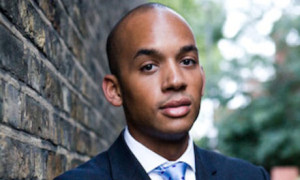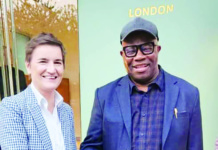When Chuka Umumnna MP and shadow Business Secretary walked into Herbert Smith on the morning of Thursday, 31st October, 2013, the obvious clue would have been to expect a lot of Labour programmes being enunciated. Yes, he did that and a little more than more. Nostalgic about the days of yore when there were few blacks in a similar gathering, his pleasure and enthusiasm couldn’t be hidden at the assemblage that proved that Black Britain had so much to offer, and indeed were, if the gathering of the professionals in seating were to pulse a beat, there would be many a beat to keep the heart of London going.
Yes, he was one of them then; yes he was there, and he knew the feeling. Now he has come: picking up the beats from yesterday in the space of Herbert Smith Freehills LLP with the kite of the Black History Month celebration to talk about the Britain today looking at tomorrow.
And NOTICED, an inter-firm initiative across the legal sector aimed at promoting “Networking Opportunities to Integrate, Celebrate and Educate on Diversity” simply made sure there was something to ‘notice’. That is a core mandate.
Hear him.
And I’m delighted to be speaking to a room full of black City professionals. There was a time when the numbers of black City professionals would barely have filled this room – when we all knew each other so well because there were so few of us. That is no longer the case and that says to me that despite all the obstacles black people have faced, we are making progress.
And when I say “we”, I actually mean Britain – all of us – whatever our race, in every walk of life.
Because I think there’s a powerful desire in this country to live in a society where people have the opportunity to achieve their dreams and aspirations regardless of their background. A social contract: shared responsibilities should mean shared opportunities and shared prosperity.
Because if we hold back any part of society – in this context black Britons – then we hold ourselves back as a country. And that’s something we can’t afford to do at a time when, as Ed Miliband has said, we need the talents of everyone to help shape our future in this modern, complex and competitive world.
So progress is vital for individuals – and it is vital for us as a country.
Celebrating progress
The progress we have made is now deeply embedded in the British psyche.
Emile Sande and Tinie Tempah have provided the soundtrack to our lives over the last few of years. Zadie Smith is a regular fixture on our Kindles. The entire country celebrates whenever Mo Farah or Jessica Ennis-Hill cross the finish line.
That is one view of progress – and an important one.
But there are other perspectives on progress too, which can no longer be ignored. Pick up a copy of the Powerlist – the annual list of Britain’s most influential black people – and you will also see those achieving excellence in other fields: like here in the City, in our Boardrooms, in medicine, in science and other areas – where black people are not so prominent.
So you’ll see Thiam Tidjane, CEO of Prudential, in the Powerlist Hall of Fame. He became CEO in 2009, and under his leadership the value of the company has more than doubled.
You’ll see Mo Ibrahim, who came to this country from Sudan in 1974, started working as a BT engineer and ended up founding Celtel International, one of Africa’s leading mobile phone companies. With over 24 million subscribers in 14 countries, Celtel was sold in 2004 for $3.4bn. That’s not a bad return!
Inspiring the next generation
You see, it’s so important that we use Black History Month not only to celebrate those on whose shoulders we stand who broke down the barriers in times past – but also those who are pioneering a new future today.
Both are vital to giving our young people the confidence and inspiration to back themselves and go after their ambitions and dreams.
If young black people can’t see people who look like them editing our newspapers, sitting on the Supreme Court or running our great British companies, how can we give them the hope that if they work hard, they can make it too?
You see, shining a light on our role models is crucial because too many of them are ignored.
One of the reasons is because our broadcast and film media have a tendency to stereotype black people: to present an image of black British people that suggests we can succeed in sport, entertainment and music, but not necessarily in other fields.
If I am wrong about this, then why do so many black British actors have to leave the UK for the US to get decent film and television roles that fall outside the stereotypes? Too many in the British film and television industries simply don’t cast black British actors in certain roles that fall outside those stereotypes.
It’s often only after they’ve made it big in the States that black British actors get more – and more varied – roles here. That is unacceptable and has got to change. As a society, we cannot allow people to default to lazy stereotypes.
Outstanding race inequalities
So, I think we all recognise that though we have made great strides towards a more equal society, we still have a long way to go.
As a non-white person in Britain today, you’re twice as likely to be unemployed as a white person.
If you are a young black graduate, you’ll earn on average only three quarters of what a white graduate earns.
If you have an African-sounding surname, you need to send about twice as many job applications as those with traditional English names – not even to get a job – but just to get an interview.
And I’m being generous here. I haven’t gone into the over-representation of black people in the criminal justice and mental health systems – or the disproportionate numbers of young black Caribbean boys, say, being excluded in our schools.
So the message is clear:
If you believe that we are all created equal and ours should be an equal society – then we cannot let up. Our commitment cannot waver. We cannot be complacent.
Carrying on Labour’s tradition tackling race inequality
That’s why I’m a proud to be Labour. Over the years it was my party that enshrined non-discrimination as a guiding principle not only of our beliefs, but also of our laws – from the Race Relations Act of 1965 to the 2006 anti-age discrimination regulations.
And during our most recent period in office, we did what the previous Conservative government failed to do – to set up the full judicial inquiry into the disgraceful mishandling by the police of the investigation into the murder of Stephen Lawrence, an inquiry that acknowledged formally for the first time what we all knew to be true – that there is institutional racism in our country – and we sought to deal with it.
Of course, the real credit for that inquiry belongs to the Lawrence family for their refusal to give up in their demand for justice – and I am proud to say Baroness Doreen Lawrence formally became a Labour peer this month following her nomination by Ed Miliband. That tradition of working to stamp out discrimination in all its forms – deliberate or subconscious – wherever it exists, continues. Just last week our new Shadow Equalities Minister, Gloria De Piero, launched our race equality strategy. We are consulting on it so please visit our website at yourbritain.org.uk and have your say.
Social mobility stalled
So I’ve talked about progress made, the need to challenge stereoptypes, and the ongoing quest for race equality in Britain. But we must go beyond this.
I think we’re unlikely to see future generations of black British people go on and do better than the last if we focus on race inequality alone – we must address issues of class and social mobility which are holding people back as well.
Social mobility is an annoyingly dry phrase for something so fundamental to all of us: making possible the basic desire of people to create a better future for themselves and their families.
I’ve worked very hard to get to where I have. However, I do believe that I would have had to work even harder had I not come from a middle class background. When I was growing up the black middle class was still in its infancy. But now it is growing.
However, unless we make social mobility for everyone our driving purpose, people won’t be able to meet their aspirations, we will not be a more equal society and we won’t make the most of our potential as a country.
Just two weeks ago, the Government’s Social Mobility & Child Poverty Commission couldn’t have been clearer:
Britain remains a deeply divided society and economic disadvantage still strongly shapes life’s opportunities. They say there’s a real danger that social mobility could go into reverse in the first part of this century if we don’t act.
So our goal is not only to eradicate prejudice in all its forms and reduce racial and other inequalities, but to create a society where if you want to get on, move out of your flat into a house, progress from the shop floor to the board room, we empower you to do it.
We want to create a society in which the son of a bus driver can go on not only to run but own the bus company. A society where the teenager working the check out at Sainsbury’s in Streatham Common can become its CEO. A society where the budding Richard Bransons and Mo Ibrahims growing up on the Tulse Hill Estate, in one of the most deprived wards in my constituency, can turn their ideas into thriving businesses and make their first million.
Because it is in all our interests – it not only creates wealth for the individual, jobs and growth, and of course tax receipts for the Exchequer!
But that is not our country today. Social mobility has stalled. As Alan Milburn, chair of the Commission said – over the last few decades we’ve become a wealthier society but we haven’t really become a fairer one.
So let me be clear: increasing social mobility and empowering people to meet their aspirations goes to the heart of my politics, it goes to heart of Labour’s values, it goes to the heart of the One Nation Britain Ed Miliband seeks to lead. Neither your race nor your class should stand in the way of opportunity.
What Labour will do to kick start social mobility
We sought to increase social mobility in Government, investing heavily in education, Sure Start and thousands of new Children’s Centres just a couple of the measures to help give our children a better start in life, important drivers of life chances.
But it wasn’t enough. While we managed to stop income inequality growing, we weren’t able to reverse the massive growth in inequality that happened in the two decades before ‘97.









